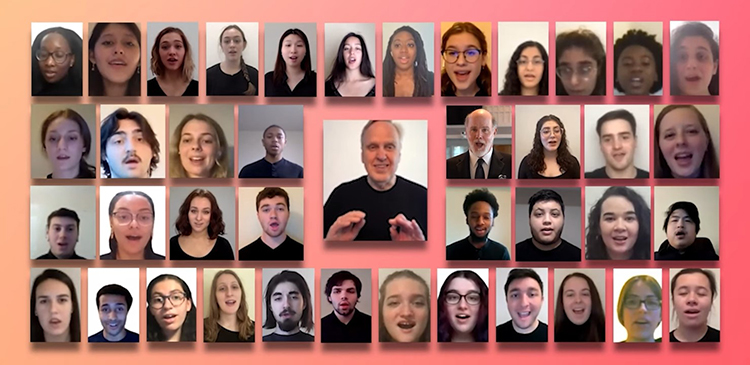Approximately 120 Mason music students recorded a digital concert to celebrate unity and resilience in the face of division and uncertainty. The concert, “A Song of Freedom,” presented by Mason’s Reva and Sid Dewberry Family School of Music, showcases works by Black composers as well as selections inspired by the African-American experience.
The program, which debuts Saturday, May 8 as part of Mason Arts at Home, features two world premieres commissioned by the Dewberry School of Music from renowned composer Evelyn Simpson-Curenton and Michael W. Nickens, aka Doc Nix, Associate Professor of Music and Director of the Green Machines Ensembles.
“This magnificent concert is a true collaboration across our Dewberry School of Music students, faculty, and staff and is a celebratory finale to an unparalleled year,” said Linda A. Monson, Dewberry School of Music Director.
The performance includes students from the Mason Symphony Orchestra, University Choirs, Wind Symphony, Green Machine, Trombone Choir, Percussion Ensemble, and Tuba/Euphonium Ensemble. Alumnus Mike Vitale Mike Vitale ('10 music education) made a guest appearance on baritone saxophone on the recording.
Master of Music Composition student Andrew Sharrock ('16 bachelor's of music education), played trumpet for the concert, and praised Nickens for his attention to detail in the composition. "I have loved getting to work with Dr. Nickens and hearing about the influences he had when writing his piece. He was so incredibly intentional with every note and marking. When it came time to record my part I was able to do so in a musically fulfilling manner."
Musicians received backing tracks of 2-8 measures which they recorded and sent back to Nickens, who edited the recordings together said Sharrock, band director at Glasgow Middle School
Mason students were also involved in crafting the artwork and audio-editing the program.
Rosie G. Wright, a junior majoring in vocal performance, sang in the ensemble pieces and was a featured soloist for the commissioned piece "Passages" and "Light Of a Clear Blue Morning."
"Recording parts for all the choral pieces was a bit of a challenge," Wright said. "It’s nothing like being in person especially since you can’t hear the ensemble around you, but after much trial and error we made it work. It was very rewarding to hear our final products after only singing by ourselves into a computer for 3 months."
Wright also enjoyed the opportunity to hear directly from Evelyn Simpson Currenton about how she made her musical choices when composing "Passages."
Cynthia “CJ” Davis, a junior majoring in government and international politics with minors ins psychology and studio art, colorized a black and white original picture of Frederick Douglas, and took pictures of the process. “I chose purple for royalty and strength, and maroon to symbolize empowerment.” Nickens then put the artwork in a video to match the musical composition.
"No matter how far we are from each other, music and technology will always bind us together," said Grayson Crouch, a junior music major who served as an audio editor and vocalist for all of the songs in this program.
Simpson-Curenton’s world premiere of “Passages” features students from across the University Choirs, a guest solo appearance by School of Music alumna and Metropolitan Opera artist Aundi Marie Moore, as well as solos by current students Rosie Wright, Case Hope, and Eliyahu Young. Stanley Engebretson, director of choral studies, said “Passages” uses phrases from the Bible and other sources and lifts up the ideals of justice and of loving the common good.
“I have known Evelyn Simpson Curenton’s fine work for many years, so we were elated when she agreed to write a special commission,” said Engebretson, who added that the concert is special to him since he’s retiring June 1.
Nickens’ original work, “The Orator, The Abolitionist, The Man: Frederick Douglass” is based on the 1893 biography written by his great-great grandfather James Monroe Gregory, a contemporary of Douglass. His piece features the Mason Wind Symphony, members of the Green Machine, and spoken word derived directly from the biography and Douglass’ speeches, delivered as narration by Nickens himself. Around 30 musicians, and one visual artist, participate in this performance.
“This project presented many opportunities to problem solve and reimagine my process,” said Nickens. “Two things that helped immensely were watching how students that have worked with closely continued to deliver for me, and getting to interact with students with whom I hadn’t ever worked or socialized.”
“Expect to witness the resilience of the collaborators,” Nickens added. “The bonds of our community transcend the limitation of the pandemic the same way Douglass’s clear message transcends time.”






